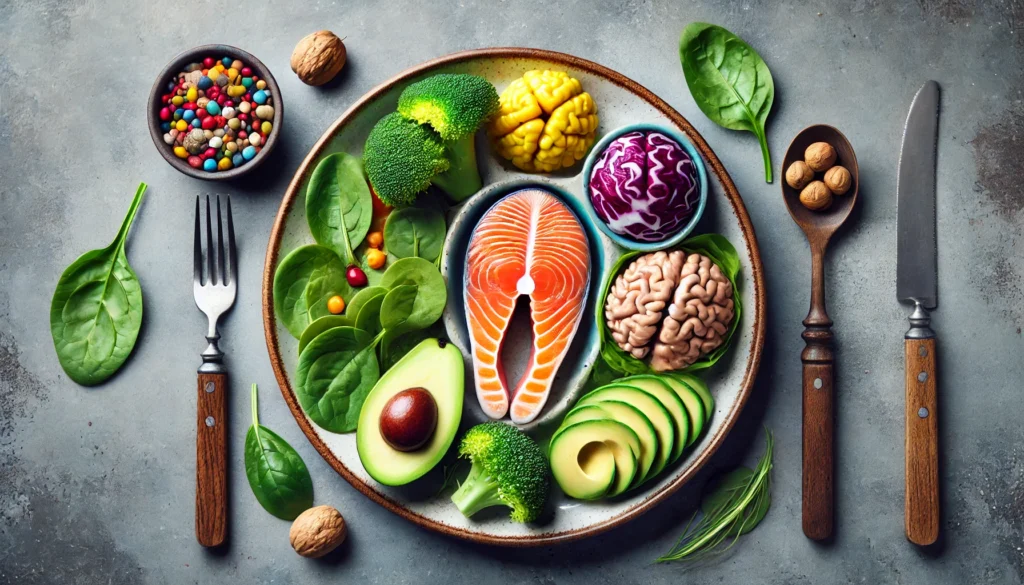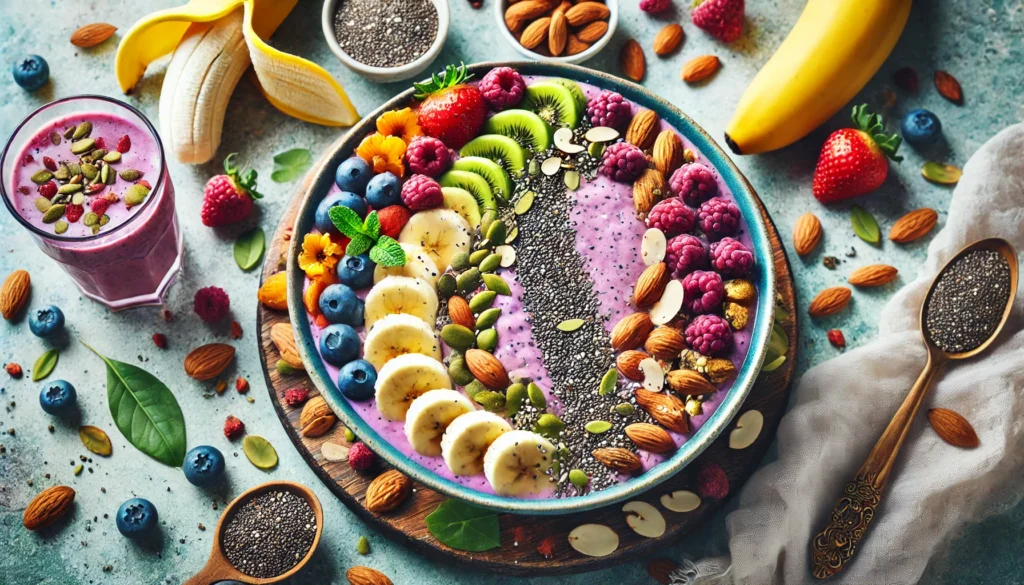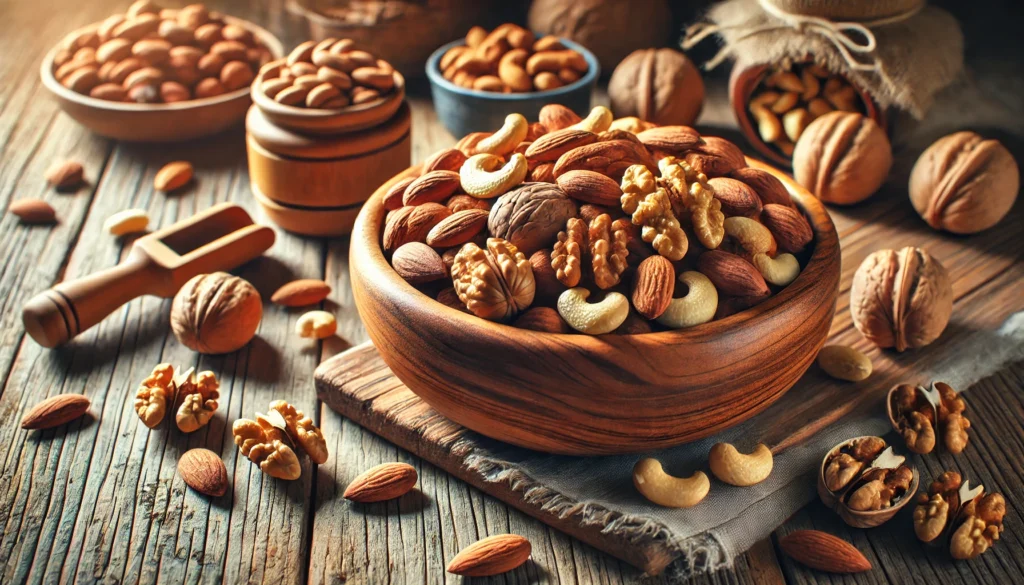In our fast-paced world where information overload is the norm, maintaining a sharp memory is more crucial than ever. The ability to recall information efficiently and accurately can impact everything from personal relationships to professional success. While genetic factors and lifestyle choices play significant roles in cognitive health, diet is a key component that can be optimized to enhance brain function. With the right nutrition, you can not only bolster your memory but also improve overall cognitive health. This article delves into memory-boosting foods that not only support brain health but also offer a delicious route to better cognitive function.
You may also like: Morning Rituals to Boost Your Memory
The Science of Brain Foods
Understanding the link between diet and brain health requires a dive into the complex interplay of nutrients and brain function. The brain, being one of the most metabolically active organs in the body, demands a high amount of energy and nutrients to function optimally. Foods rich in antioxidants, good fats, vitamins, and minerals provide energy and aid in protecting against brain diseases. Here, we explore the top foods scientifically proven to enhance memory and cognitive function.
The Role of Antioxidants in Brain Health
Antioxidants are critical for combating oxidative stress, which can damage brain cells over time. Oxidative stress is a major factor in the development of neurodegenerative diseases such as Alzheimer’s and Parkinson’s. Foods high in antioxidants, like berries and nuts, help neutralize free radicals and reduce inflammation, thereby safeguarding brain cells.
Regular consumption of antioxidant-rich foods can slow the progression of cognitive decline and support long-term brain health. Discover more about antioxidant-rich foods that contribute to brain health in this list of the top 10 brain foods.
The Importance of Omega-3 Fatty Acids
Omega-3 fatty acids are essential for building and maintaining brain cell membranes. They support neuron structure and improve communication between brain cells, which is vital for memory and learning. These fatty acids are linked to lower levels of beta-amyloid, the protein that forms plaques in the brain associated with Alzheimer’s disease. Incorporating omega-3-rich foods like fatty fish into your diet can significantly enhance cognitive function and memory retention. Learn more about the role of essential fats in optimizing brain function and memory enhancement.
Vitamins and Minerals: The Brain’s Building Blocks
Vitamins and minerals such as vitamin E, B vitamins, and magnesium play integral roles in brain health. Vitamin E acts as a powerful antioxidant, protecting brain cells from damage. B vitamins are crucial for energy production and the synthesis of neurotransmitters, while magnesium supports nerve transmission and cognitive function. Ensuring a diet that includes a variety of these nutrients can provide the necessary building blocks for a healthy brain.
Nuts: A Nutrient Powerhouse
Nuts, especially walnuts, are often hailed as brain food. They are rich in omega-3 fatty acids, which are essential for brain health. Omega-3s help build membranes around brain cells, improving the structure of neurons. Additionally, nuts contain antioxidants that combat oxidative stress and inflammation, which are known to contribute to neurodegenerative diseases.
Walnuts: The Brain Shaped Nut
Walnuts stand out among nuts for their high concentration of alpha-linolenic acid (ALA), a type of omega-3 fatty acid. Their shape, reminiscent of a brain, is a fitting metaphor for their brain-boosting properties. Regular consumption of walnuts can enhance cognitive performance and delay age-related cognitive decline. They are also rich in polyphenolic compounds that provide additional neuroprotective benefits.
Like walnuts, eggs are another nutrient-rich option for aging minds, offering vital support for memory and cognition. Learn more about how these versatile foods enhance brain health.
Almonds and Vitamin E
Almonds are an excellent source of vitamin E, a nutrient that has been linked to cognitive health in aging populations. Vitamin E helps to protect the brain from oxidative stress, which can lead to cognitive decline. A daily handful of almonds can provide a significant portion of the recommended daily intake of vitamin E, offering a simple yet effective way to support brain health. Explore deeper into the cognitive benefits of almonds and how they contribute to brain health.
Mixed Nuts: A Balanced Snack
Incorporating a variety of nuts, such as hazelnuts, cashews, and pecans, can offer a balanced mix of nutrients. Each type of nut contributes different vitamins and minerals, creating a synergistic effect that enhances brain health. A handful of mixed nuts can serve as a great snack for boosting brain health, providing both the energy and nutrients needed to support cognitive function.

Berries: Nature’s Antioxidants
Berries, particularly blueberries, are packed with antioxidants like flavonoids that support brain health. Flavonoids have been shown to enhance memory by improving communication between brain cells and reducing inflammation. Studies suggest that diets rich in berries can delay brain aging and improve memory.
Blueberries: The Antioxidant Superstars
Blueberries are often referred to as a superfood due to their high antioxidant content. These tiny fruits are rich in anthocyanins, compounds that have been shown to cross the blood-brain barrier and exert protective effects on the brain. Regular consumption of blueberries can improve brain function, particularly in areas related to memory and learning.
Strawberries and Cognitive Health
Strawberries are another excellent source of flavonoids, particularly fisetin, which has been linked to improved cognitive function. Fisetin has been shown to reduce the risk of cognitive decline and enhance memory performance. Incorporating strawberries into your diet can be a sweet and enjoyable way to support brain health.
Raspberries and Neuroprotection
Raspberries are rich in ellagic acid, an antioxidant that helps protect brain cells from oxidative damage. This compound also has anti-inflammatory properties, which can reduce the risk of neurodegenerative diseases. Including raspberries in your diet can provide a delicious way to enhance neuroprotection and support cognitive function.
Fatty Fish: Omega-3 Rich Delicacies
Fatty fish such as salmon, mackerel, and sardines are abundant in omega-3 fatty acids, which are crucial for brain health. Omega-3s are linked to lower levels of beta-amyloid, the protein that forms damaging clumps in the brains of people with Alzheimer’s disease. Consuming fish regularly can help enhance memory and protect against cognitive decline.
Explore the specific brain-boosting benefits of fish and why it is a staple in cognitive-friendly diets. These foods are essential for maintaining memory and focus over time.
Salmon: The King of Omega-3s
Salmon is one of the best sources of omega-3 fatty acids, particularly eicosapentaenoic acid (EPA) and docosahexaenoic acid (DHA). These fatty acids are essential for maintaining brain health and function. Regular consumption of salmon can support memory retention and protect against cognitive decline, making it a valuable addition to any brain-healthy diet.

Mackerel: A Nutrient-Dense Choice
Mackerel is another fatty fish that provides a high concentration of omega-3s. In addition to these essential fatty acids, mackerel is rich in vitamin D and selenium, nutrients that further support brain health. Including mackerel in your diet can enhance cognitive function and provide a range of health benefits.
Sardines: A Small Fish with Big Benefits
Sardines are small but mighty when it comes to brain health. They are packed with omega-3 fatty acids, vitamin B12, and vitamin D, all of which play crucial roles in cognitive function. Regular consumption of sardines can improve memory and protect against cognitive decline, making them a convenient and affordable option for boosting brain health.
Leafy Greens: The Brain’s Best Friend
Leafy greens like spinach, kale, and broccoli are rich in brain-healthy nutrients such as vitamin K, lutein, folate, and beta-carotene. These nutrients are known for their role in supporting brain health and cognitive function. Studies have shown that consuming leafy greens can slow cognitive decline and improve memory.
Spinach: The Nutrient Powerhouse
Spinach is loaded with lutein, an antioxidant that accumulates in the brain and helps protect against cognitive decline. It also contains high levels of folate, which is essential for brain function and neurotransmitter synthesis.
Learn more about nutrient-dense foods like spinach that promote mental wellness and cognitive health. Incorporating such foods into your diet can enhance memory and protect against cognitive decline.
Kale: A Superfood for the Brain
Kale is often touted as a superfood, and for good reason. It is rich in vitamin K, which is linked to improved cognitive performance and memory retention. The antioxidants in kale help reduce inflammation and protect brain cells from damage, making it an excellent choice for supporting brain health.

Broccoli: The Brain-Boosting Vegetable
Broccoli is a cruciferous vegetable that provides a wealth of brain-boosting nutrients. It is high in sulforaphane, a compound that has been shown to protect brain cells from oxidative stress. Regular consumption of broccoli can enhance cognitive function and support long-term brain health.
Learn about the top foods that combat dementia and how leafy greens play a vital role in maintaining long-term cognitive health. Including them in your meals can help safeguard your brain from age-related decline.
Foods and Drinks to Improve Memory
Dark Chocolate: A Sweet Memory Enhancer
Dark chocolate is not just a treat for the taste buds; it’s also a treat for the brain. It contains flavonoids, caffeine, and antioxidants, which have been shown to boost memory, attention, and mood. The flavonoids in chocolate accumulate in areas of the brain responsible for learning and memory, enhancing cognitive function.
The Flavonoid Advantage
Flavonoids, particularly those found in dark chocolate, have been linked to improved blood flow to the brain. This increased circulation can enhance cognitive function and support memory retention. Including a small amount of dark chocolate in your diet can provide a delicious way to boost brain health.
Explore how brain-boosting foods, including dark chocolate, can enhance your cognitive health and overall well-being. These foods combine nutrition and enjoyment, making them an easy addition to your diet.
The Role of Caffeine
Caffeine in dark chocolate can enhance alertness and concentration by blocking adenosine receptors in the brain. This effect can lead to improved mood and cognitive performance. Consuming dark chocolate with a high cocoa content can maximize these benefits while satisfying your sweet tooth.
Antioxidants and Neuroprotection
The antioxidants in dark chocolate help protect brain cells from oxidative damage. These compounds can reduce inflammation and lower the risk of neurodegenerative diseases. Opting for chocolate with at least 70% cocoa content can provide the greatest neuroprotective benefits.
Coffee: More Than Just a Morning Boost
Coffee lovers rejoice! Your favorite morning brew has more benefits than just waking you up. Caffeine and antioxidants present in coffee are linked to improved brain function. Caffeine increases alertness by blocking adenosine, a chemical that makes you feel sleepy. It also enhances mood and sharpens concentration, providing a short-term memory boost.
Dive deeper into the role of memory-enhancing beverages and how coffee stands out among them. These drinks provide cognitive benefits that go beyond the short-term energy boost.

Caffeine and Alertness
Caffeine is a central nervous system stimulant that can enhance cognitive performance by increasing alertness and reducing fatigue. This effect can lead to improved memory and concentration, making coffee an effective tool for boosting brain function.
Antioxidants in Coffee
Coffee is rich in antioxidants, particularly chlorogenic acids, which have been shown to protect brain cells from oxidative stress. These compounds can reduce inflammation and support cognitive health, making coffee a valuable addition to a brain-healthy diet.
The Importance of Moderation
While coffee can provide numerous cognitive benefits, moderation is key. Excessive caffeine intake can lead to negative side effects such as anxiety and sleep disturbances. Enjoying coffee in moderation can maximize its benefits while minimizing potential drawbacks.
Energizing foods, when consumed mindfully, can complement beverages like coffee in boosting mental focus. Discover how to balance your diet with these brain-friendly options.
Green Tea: A Calming Cognitive Protector
Green tea is renowned for its long list of health benefits, and brain health is no exception. It contains L-theanine, an amino acid that can cross the blood-brain barrier and increase the activity of the neurotransmitter GABA, which helps reduce anxiety and increase dopamine. The combination of caffeine and L-theanine in green tea has synergistic effects that improve brain function, enhancing memory and focus.
Discover how green tea and other beverages can help combat dementia while supporting long-term brain health. These drinks offer a balance of calming and stimulating effects for enhanced cognition.
L-theanine and Relaxation
L-theanine promotes relaxation without drowsiness by increasing alpha brain waves. This effect can enhance cognitive performance and improve focus, making green tea an excellent choice for supporting brain health.
The Synergistic Effects of Caffeine and L-theanine
The combination of caffeine and L-theanine in green tea can enhance cognitive function by improving attention and memory. This synergistic effect can provide a balanced boost to brain health without the jittery effects often associated with caffeine.
Antioxidants in Green Tea
Green tea is rich in antioxidants, particularly catechins, which have been shown to protect brain cells from damage. These compounds can reduce inflammation and support long-term cognitive health, making green tea a valuable addition to any brain-healthy diet.
Best Cereals for Memory
Whole grains like oats, barley, and quinoa are excellent sources of complex carbohydrates and fiber, providing a steady supply of energy to the brain. They also contain B vitamins that support brain health and reduce inflammation. Starting your day with a bowl of whole-grain cereal can help maintain cognitive function and improve memory.
Oats: A Heart and Brain-Healthy Choice
Oats are a rich source of beta-glucan, a soluble fiber that supports heart health and provides sustained energy to the brain. They are also high in B vitamins, which are essential for brain function and neurotransmitter production. Incorporating oats into your breakfast can support cognitive health and improve memory.
Barley: A Nutrient-Dense Grain
Barley is another whole grain that provides a wealth of brain-boosting nutrients. It is high in fiber, vitamins, and minerals, all of which support cognitive function and brain health. Including barley in your diet can provide a steady supply of energy to the brain, enhancing memory and concentration.
Quinoa: The Complete Protein
Quinoa is a unique grain that provides all nine essential amino acids, making it a complete protein. It is also rich in antioxidants, vitamins, and minerals that support brain health. Including quinoa in your diet can provide a balanced source of nutrients that enhance cognitive function and memory.
Fruits That Enhance Memory
Fruits such as oranges, apples, and avocados are packed with essential vitamins and antioxidants that support brain health. Oranges are rich in vitamin C, which is crucial for preventing mental decline. Apples contain quercetin, an antioxidant that protects brain cells from damage. Avocados, although technically a fruit, provide healthy fats that support brain function.
Oranges and Vitamin C
Oranges are an excellent source of vitamin C, a powerful antioxidant that supports immune function and brain health. Regular consumption of oranges can protect against cognitive decline and enhance memory, making them a valuable addition to a brain-healthy diet. Oranges also contribute to a stronger immune system, further enhancing overall health. Discover how foods like oranges can serve as dual-purpose nutrients for your brain and body.
Apples and Quercetin
Apples are rich in quercetin, an antioxidant that has been shown to protect brain cells from oxidative stress. This compound can reduce inflammation and support cognitive function, making apples a delicious and convenient way to boost brain health.
Avocados: A Creamy Brain Booster
Avocados are high in monounsaturated fats, which support brain health by improving blood flow and reducing inflammation. They also contain folate and vitamin K, nutrients that enhance cognitive function and memory. Including avocados in your diet can provide a creamy and nutritious boost to brain health.
Conclusion: Nourishing Your Brain
Optimizing brain health through diet is a proactive approach to maintaining cognitive function and enhancing memory. By including a variety of nutrient-rich foods, you can support your brain’s health and performance. Healthy eating tips can guide you in incorporating brain-nourishing foods seamlessly into your lifestyle. Small, consistent changes to your diet can have a significant impact on cognitive health.
Integrating Brain-Healthy Foods into Your Diet
Incorporate these foods into your daily routine and experience the benefits of a nourished brain. Experiment with new recipes and meal ideas to make brain-healthy eating enjoyable and sustainable. Remember, a healthy brain is the foundation of a healthy life, so start making these foods a staple in your diet today.
The Long-Term Benefits of a Brain-Healthy Diet
A diet rich in memory-boosting foods can provide long-term benefits for cognitive health and overall well-being. By prioritizing brain-healthy nutrition, you can enhance memory, improve focus, and reduce the risk of cognitive decline. Embrace this delicious and nutritious approach to support your brain for years to come.

Taking Action for Brain Health
Start today by incorporating a variety of these foods into your meals and snacks. Make small, consistent changes to your diet to support brain health and improve cognitive function. With dedication and mindful eating, you can nourish your brain and enjoy a vibrant, healthy life.
Further Reading:
Foods That Help Boost Your Memory
Top 10 foods to improve your memory
Important Note: The information contained in this article is for general informational purposes only, and should not be construed as health or medical advice, nor is it intended to diagnose, prevent, treat, or cure any disease or health condition. Before embarking on any diet, fitness regimen, or program of nutritional supplementation, it is advisable to consult your healthcare professional in order to determine its safety and probable efficacy in terms of your individual state of health.
Regarding Nutritional Supplements Or Other Non-Prescription Health Products: If any nutritional supplements or other non-prescription health products are mentioned in the foregoing article, any claims or statements made about them have not been evaluated by the U.S. Food and Drug Administration, and such nutritional supplements or other health products are not intended to diagnose, treat, cure, or prevent any disease.


